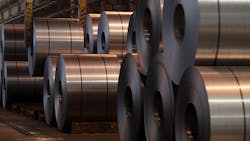Trump's Steel Curbs Risk Trade War as 'Pandora's Box' Opens
There’s a risk of a global trade war should President Donald Trump decide to restrict imports of steel, according to Japan’s leading mills group, which warns any new U.S. curbs on the metal may provoke a tit-for-tat response that could drag in other products.
Concern would deepen about the potential spread of protectionism if Trump acts, Kosei Shindo, chairman of the Japan Iron and Steel Federation, told reporters in Tokyo on Monday. A trade fight beyond steel could happen if countries retaliated in other areas, such as farm products, Shindo said.
The U.S. administration has pledged stringent new measures to protect local steel producers against overseas rivals as Trump seeks to deliver on campaign-trail comments that the trade is unfair. The potential for restrictions comes even as figures from China -- which makes half of global supply -- show that overseas sales have dropped sharply in recent months.
“If other countries respond with products other than steel, that would be opening a Pandora’s box,” Shindo said, noting that the European Union has already said it will consider retaliation if the U.S. takes action. “We are concerned about the possibility that a chain of protectionism would happen.”
Earlier this year, Trump ordered the Commerce Department to probe steel imports under the seldom-used Section 232 of the Trade Expansion Act of 1962, which allows the president to impose trade measures if the government finds evidence of a national-security threat from foreign shipments.
Autos and Agriculture
The scope for retaliatory action in areas other than steel has also been flagged by producers in China. Li Xinchuang, vice-president of the China Iron and Steel Association, told the South China Morning Post in an interview that if Washington imposed additional tariffs on Chinese steel, that country could hit back by restricting imports of U.S. autos and agriculture products.
The potential curbs drew criticism this month from top economists in the U.S. including Former Federal Reserve chairman Ben Bernanke. Tariffs would damage the U.S. economy by raising costs and boosting prices, the American Action Forum, a Washington-based think tank, said in a recent letter signed by 15 former chairs of the White House council of economic advisers.
Japan isn’t among the top steel suppliers to the U.S., ranking seventh in terms of shipments, according to Shindo. In 2016, Japan exported about 2 million tons to the country, out of total imports of about 30 million tons, and 90 million tons of domestic demand, he said.
While Shindo doesn’t see any problems for Japanese steel, in terms of U.S. national-security issues, choking off supply would hurt customers there. “We export valued-added steel products that can be made only in Japan,” he said, referring to specialty grades. If such products disappear, “we will put the trouble on customers in the U.S.,” he said.
By Masumi Suga
About the Author
Bloomberg
Licensed content from Bloomberg, copyright 2016.
